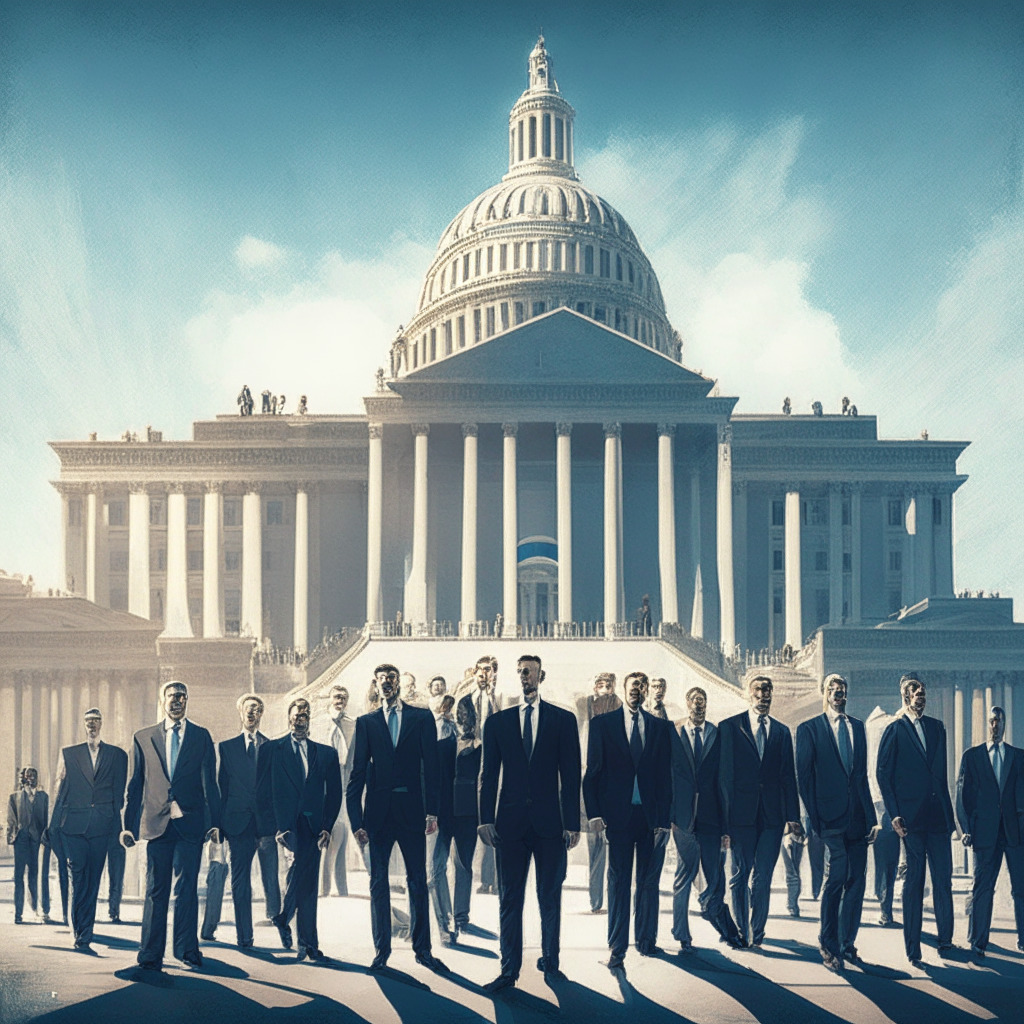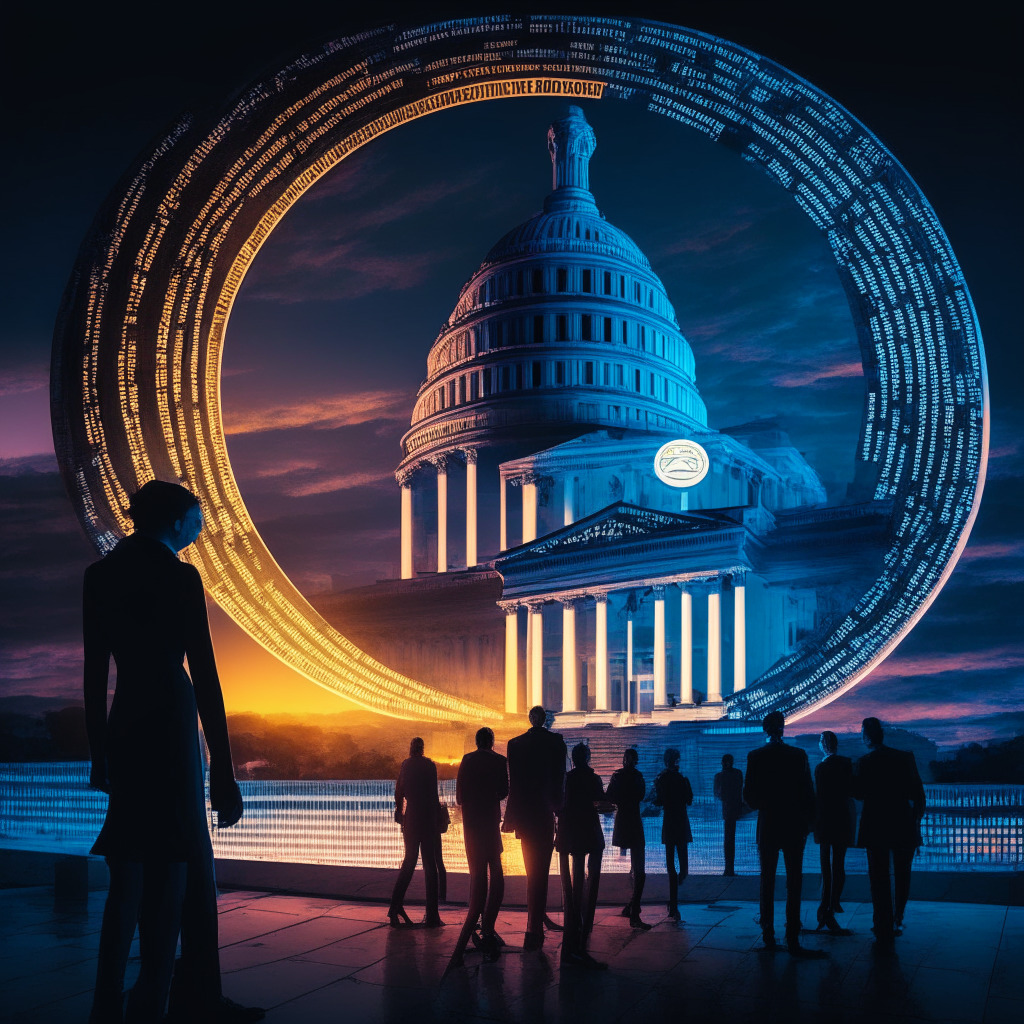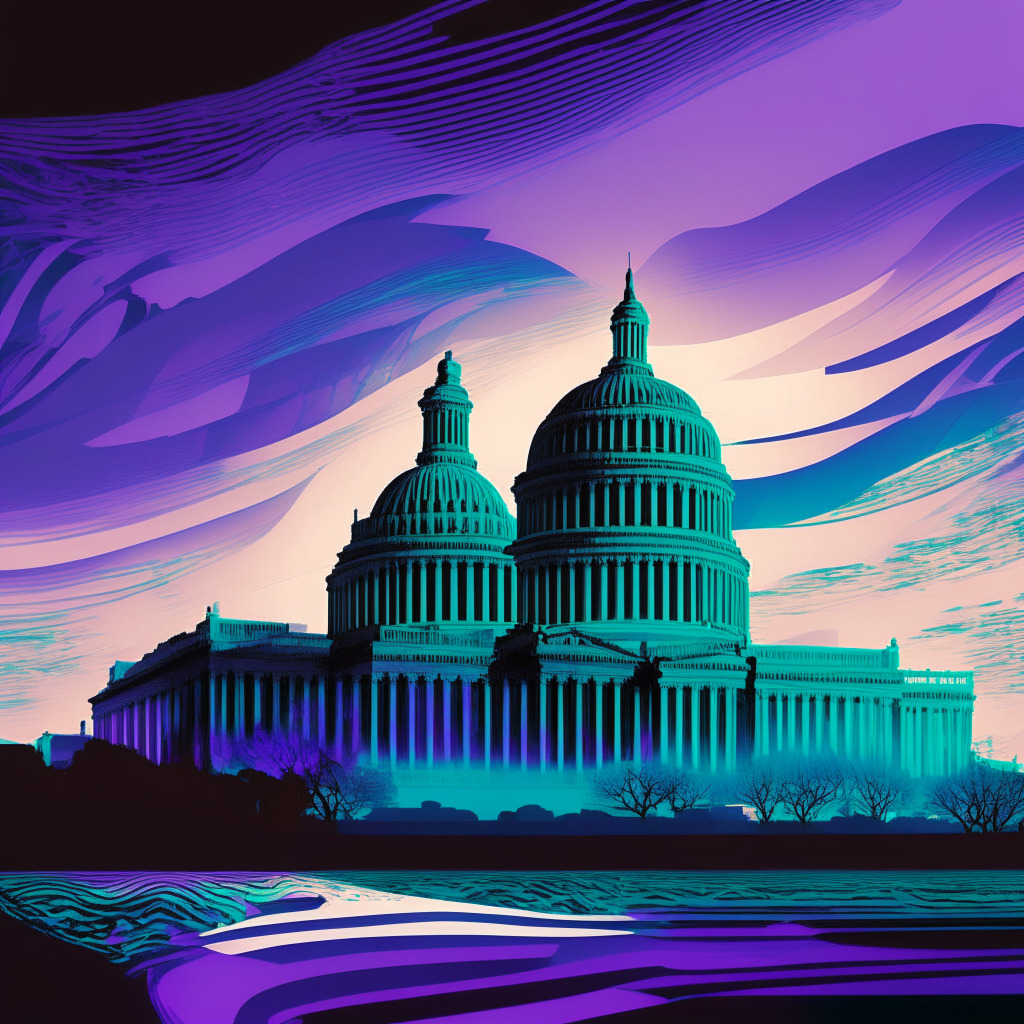The Washington D.C. assembly in October aims to align traditional and decentralized finance with policy goals. This high-level meeting, convening top legal and compliance officers and policy leaders, aims to create a secure future for the digital economy. However, challenges, especially over digital currency regulations, are expected. The goal is to create crypto regulatory frameworks that meet governmental and corporate interests while ensuring market competitiveness and promoting innovation.
Search Results for: Washington D.C.
Crypto Controversy: Bankman-Fried, FTX, and the $3M DC Property Mystery
A Washington D.C. townhouse previously linked to defunct crypto exchange FTX and its former CEO, Sam Bankman-Fried, may soon change ownership. This comes amid heightened skepticism towards crypto exchanges, increased regulatory scrutiny, and concerns regarding user fund protection following FTX’s collapse.
Coinbase’s Fight for Crypto Regulations: A Brave Campaign or Futile Effort?
“Coinbase CEO, Brian Armstrong, and US crypto entrepreneurs are lobbying Washington for clearer digital currencies rules to simplify regulatory compliance. However, political obstacles and issues like crypto money laundering can hinder the acceptance of these new rules.”
Crypto’s Journey through the Labyrinth of US Law: Struggles, Triumphs, and Future Projections
“In just a half decade, the digital assets industry has seen significant evolution. Despite challenges caused by regulatory scrutiny, anti-money-laundering concerns, and varying political views, the adoption trend for crypto continues to rise. The anticipated regulatory changes and upcoming elections, particularly in 2024, present an opportunity for a fresh perspective on digital assets’ development and use.”
Failing or Succeeding? Evaluating The Blockchain Association’s Influence on Crypto Legislation
The Blockchain Association, a leading crypto trade association, continues to face skepticism and regulatory hurdles despite its five-year existence. With progress impeded by the fall of FTX and reduced support from congress members, the association’s efforts to pass comprehensive crypto legislation remain unsuccessful. Notwithstanding these setbacks, it has managed some victories in mitigating impacts of proposed regulations and supporting member companies. However, the future still presents significant obstacles, and crypto lobbyists are urged to remain humble about their “achievements.”
Unraveling the Regulatory and Ethical Quagmires: Navigating through the Crypto Landscape
A U.S. federal judge delayed a sentencing hearing for radio host Ian Freeman, who allegedly created an illegal Bitcoin exchange used by scammers. Meanwhile, the DeFi Education Fund contests a patent claim by tech company True Return Systems. Also, DigiFT’s dETH0924 provides up to 4% APR, boosting Ethereum’s PoS mechanism, while crypto infrastructure provider Qredo integrated Circle’s USDC stablecoin into its wallet.
Google’s Digital Futures Project: A Beacon for Ethical AI or Deflection Strategy?
Google’s Digital Futures Project aims to promote the secure, responsible use of AI through research and collaboration with think tanks and academic institutions. However, skeptics question potential conflicts of interest, highlighting the need for transparency in its operations.
Navigating Crypto Regulations: Lessons from Hong Kong and the US’s Missed Opportunities
“Web3 companies are shying away from New York due to stringent crypto regulations. In contrast, China and Hong Kong are embracing innovation in the crypto space, showing flexibility and support for sector growth, posing attractive alternatives for crypto enterprises.”
AI Safety Legislation: Balancing Innovation and Public Trust in the Era of Artificial Intelligence
US Senate Majority Leader Chuck Schumer plans to call for comprehensive legislation regarding AI safety measures, emphasizing bipartisan action from Congress. Addressing safe innovation, privacy, biases, and misinformation, Schumer aims to ensure responsible and secure AI development while maintaining public trust in the technology.
Heath Tarbert Joins Circle: A Regulatory Game Changer for Stablecoins and Crypto Markets
Circle hires Heath Tarbert as Chief Legal Officer in order to leverage his expertise amid regulatory challenges. Circle’s CEO believes Tarbert’s background in international organizations and governments will prove crucial for building durable relationships while advocating for comprehensive stablecoin legislation to restore confidence in digital assets.
BNB Market Cap Plummets Amid SEC Lawsuit: How Low Can Binance’s Token Go?
BNB’s market capitalization dropped by $7 billion since the SEC filed a lawsuit against Binance, causing concerns about the token’s price future. Technical analysis suggests a short-term bounce, but BNB could potentially fall to around $180 in 2023 due to ongoing Binance-SEC battles.
ESG Investing Meets Blockchain: PoS, Sustainable Policies, and Bridging the Political Gap
Experts at a recent Consensus conference discussed promoting Proof-of-Stake (PoS) consensus mechanisms for a sustainable crypto future, addressing climate change concerns. To attract institutional investments, blockchain companies must prioritize ESG-friendly policies and establish mutual understanding with regulators and political decision-makers.
Balancing AI Innovation and National Security: China and US Strive for Tech Dominance
Chinese officials express concern about artificial intelligence (AI) posing national security risks. As AI development accelerates, China pushes for tighter controls and regulatory “guardrails” to manage potential negative consequences, while still fostering innovation.
Balancing AI Innovation and Regulation: Microsoft’s 5-Point Blueprint Explored
Microsoft President Brad Smith introduces a “5-point blueprint for governing AI,” emphasizing collaboration between public and private sectors. He proposes government-required licensing for advanced AI models, acknowledging that both sectors must work together to ensure AI serves society while addressing potential risks and maintaining ethical standards.
Balancing Blockchain Future: AI Advancements, Regulations, and Risks in Focus
Microsoft President Brad Smith urges lawmakers and companies to establish regulations and risk management strategies for AI development, emphasizing the importance of corporate involvement and proposing “safety brakes” for AI systems controlling critical infrastructure.
ChatGPT App Launch: A New Era in Mobile AI and Its Implications on Blockchain
OpenAI launches an official ChatGPT app for iOS, offering seamless user experience and enhanced accessibility to the popular chatbot. Android users can expect a launch soon. Privacy remains a priority, while comparisons between ChatGPT, Google’s Bard and Microsoft’s Bing highlight the varying capabilities of AI chatbots.
Coinbase Q1 Results Surge Amidst Regulatory Concerns: Market Optimism vs. Uncertainty
Coinbase shares surge after exceeding Q1 expectations, but market experts express mixed opinions. Devin Ryan of JMP Securities remains optimistic, while JPMorgan maintains a neutral rating due to volume pressure and a declining USDC market. Goldman Sachs highlights the “highly uncertain” regulatory landscape as a significant concern, maintaining a sell rating on shares.
Expanding Horizons: Ledn’s Ethereum Yield Product & Coinbase’s Regulatory Campaign
Ledn is introducing an Ethereum yield product in response to user demand for simpler staking alternatives. Their new offering is “ring-fenced,” providing a safety layer against bankruptcy. Ledn is also launching a stablecoin Growth Account, though not available in the U.S. or Canada. Meanwhile, Coinbase is seeking clearer crypto regulations, despite skepticism due to political and regulatory concerns.
Mystery and Scandal Engulf Crypto Titan Sam Bankman-Fried’s Parents: Allegations and Insights
The parents of Sam Bankman-Fried, founders of the cryptocurrency company FTX, face allegations of using their son’s company to amass a fortune. Questions arise about potential banking violations, breaches in election law, and the use of dark money networks for political influence.
CBDC Anti-Surveillance State Act: Preserving Financial Privacy in the Age of Digital Currencies
U.S. Representative Tom Emmer, with the support of 49 other Republican representatives, reintroduced the CBDC Anti-Surveillance State Act to prevent unjust financial surveillance through retail central bank digital currencies (CBDCs). Advocates contend such government-sanctioned currency must respect financial privacy, individual freedom, and market competitiveness.
Shaping Elections 2024: How Cryptocurrency Could Swing the Political Pendulum
“Crypto guru, Brian Armstrong, predicts that the exploding interest in crypto will turn it into a defining issue in the 2024 elections. As 56 million Americans already operate with digital currency, its potential implications are engaging presidential candidates. However, the quest for clear crypto regulation still looms, with opportunities for legislative clarity potentially arising from the Securities and Exchange Commission.”
The Ripple Effect of PayPal’s PYUSD: Potentially Forcing a Shift in Stablecoin Regulation Debate
The launch of PYUSD, a stablecoin backed by PayPal with over 430 million users, may accelerate crypto adoption and prompt a shift in U.S. policy towards crypto regulation. Despite previous hesitations, the massive user base might force lawmakers to urgently develop a comprehensive regulated framework for stablecoins, heralding a new era of American crypto companies demanding inclusion in economic life.
Binance CEO Summoned by US Court Amid SEC Lawsuit: Analyzing the Implications and Conflicts
The US District Court issued a summons for Binance CEO Changpeng Zhao following the SEC suing the exchange for alleged unregistered securities operations. Binance and its CEO have 21 days to respond once served. Former Binance.US CEO Catherine Coley’s testimony in a previous SEC investigation resurfaces in the new case against the cryptocurrency exchange.
SEC Charges Coinbase: How Crypto Exchanges Navigate Regulatory Storms and Evolve
Coinbase shares dipped 16% during pre-market trading following SEC charges for allegedly violating securities laws. The SEC claims that Coinbase operated as an unregistered broker and exchange, and at least 13 listed tokens are securities. These lawsuits may increase crypto market regulation and scrutiny while presenting growth opportunities.
US Debt Ceiling Deal: A Mixed Blessing for Crypto – Debating Pros, Cons & Implications
The US debt ceiling deal has omitted crypto-related proposals like the DAME tax, offering a reprieve for the crypto industry. However, it provides no clear direction on future regulation, making it essential to monitor political developments impacting cryptocurrencies.
AI Arms Race: JPMorgan Chase’s Finance Chatbot and the Ethical Debate on Unregulated AI
JPMorgan Chase filed a trademark application for finance-focused chatbot IndexGPT, aiming to use it for advertising, marketing, tracking securities values, and providing financial information. With AI playing a significant role in future trading, the company has allocated over 2,000 experts to enhance its AI capabilities. Incorporating AI-driven solutions while mitigating risks and ethical concerns will be crucial in shaping the future of finance and technology.
Microsoft President Urges AI Regulation: Balancing Innovation and Risk in a Transforming World
Microsoft President Brad Smith urges governments to regulate AI technology, addressing emerging concerns and uniting public and private sectors. He suggests licensing AI developers and holding companies accountable for managing disruptive technology, stressing the importance of balancing AI capabilities with mitigating potential risks.
G7 Summit: Biden’s Crypto Opposition & Debt Ceiling Debate – Tax Implications & Future Regulation
At the G7 summit, President Joe Biden opposed a debt ceiling agreement allegedly favoring crypto traders through tax-loss harvesting, calling the terms “unacceptable.” The controversy highlights the need for a comprehensive regulatory framework addressing traditional finance and emerging technologies like blockchain and digital assets.
Crypto Market Tug-of-War: Analyzing Bullish vs Bearish Forces and Future Predictions
The U.S. stock market experienced a sharp recovery, while Bitcoin’s short-term outlook remains uncertain. Analysts express long-term bullish sentiments, with the possibility of “hyperbitcoinization” driving Bitcoin demand and price. As the battle between bullish and bearish forces continues, observing crypto performance and staying informed is crucial for investment decisions.
Bitcoin Reacts to Fed Chair Powell’s Remarks: Understanding Crypto’s Sensitivity to Policy Shifts
Bitcoin’s price approached $27,000 as Federal Reserve Chair Jerome Powell delivered remarks on policy, impacting both traditional finance and crypto markets. The increasing interconnectedness of these worlds underscores the importance of understanding potential policy decision outcomes for both crypto enthusiasts and skeptics alike.
Bitcoin Dips Below $27,000: Analyzing Market Impact and Federal Reserve’s Role
Bitcoin dipped to lows of $26,380 on Bitstamp amid expectations of an interest rate hike by the United States Federal Reserve in June. Factors such as low jobless claims data and hawkish Fed comments contribute to downward pressure, as traders maintain potential bearish targets around $25,000.
Crypto Market Volatility: Debt Ceiling Debates and the 2024 Bitcoin Halving Cycle
The crypto market faces downturn amidst concerns such as lack of regulatory clarity, ongoing debt ceiling talks, and cryptocurrency value. As volatility persists, investors should stay informed, anticipate future trends like the 2024 bitcoin halving, and approach the market with cautious optimism.






























